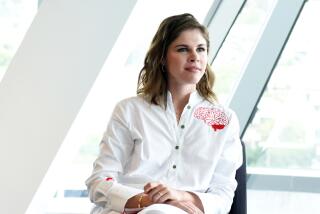Anna Post minds manners for the modern world
- Share via
Reporting from Burlington, Vt. — —
The holidays bring out the best in people — and the worst.
Which means that it’s the busy season for Anna Post, the 31-year-old great-great-granddaughter of Emily Post, who bears more than a passing resemblance to her famous forebear. As an etiquette expert for the Internet generation, she is using her legacy not so much to chastise us for using the wrong fork but to remind us to treat one another with respect — both in the real and virtual worlds.
Etiquette is the family business; seven Posts work full time at the Emily Post Institute in Burlington, Vt., including Anna’s father Peter, mom Trisha and sister Lizzie. But it is Anna who is the next face of Emily Post. For the last five years, she has immersed herself in the world of thank-you notes, wedding invitations and table manners, overseeing an empire that includes books, online training, advice blogs, etiquette seminars for children and clients such as Walgreens and financial services firm Raymond James, and an online etiquette encyclopedia that has been christened “Etipedia.”
Interest in etiquette is on the rise, Post says. One reason? Badly behaved celebrities ( Kanye West, Serena Williams, Mel Gibson and South Carolina Rep. Joe Wilson come to mind). The sputtering economy has also fueled interest in good behavior and manners.
“It’s a résumé-saturated job market, and people need every skill to set them apart,” Post says. This time of year, the recession is also the backdrop for questions about how to gift, tip and entertain on a budget.
Post, who also consults for companies such as Intel, Princess Cruises and 3M, envisions an Emily Post lifestyle brand with a wedding consulting service, e-learning programs and licensed products. (Emily Post Wedding stationery debuted this year.) There’s even an Emily Post film in development at Warner Bros., a romantic comedy in the spirit of “Julie & Julia,” she says.
That might make sense for parents and grandparents with cocktail parties and weddings in their datebooks, but what about today’s kids raised in a social media swirl with “Bridezilla” and “Jersey Shore” on the DVR? Do they care?
“I think they do,” Post says. “It has to do with how we think about the word etiquette. When kids first hear it, they think it’s for proms and visiting Grandma. But when they find out it has to do with whether it’s OK to delete a friend or ignore a friend on Facebook, it becomes real to them. And from our teen sessions, I know that boys become interested when they find out it can help them get dates.”
Soft-spoken but firm, Anna has the demeanor of a kindergarten teacher. In her office, shelter magazine clippings are taped to the walls (she recently bought a New England-style cottage with her boyfriend), along with the framed slogan “Keep Calm and Carry On.”
Dressed in tan trousers, a short-sleeve button-down shirt and open-toe shoes, she comes across as professional but not stuffy. (A pair of flip-flops is stashed under her desk. )
“I’ve heard stories that in boarding school, there were kids who didn’t want to eat with me because they were worried that I would critique them,” she says. “But even if I did notice someone holding a fork egregiously wrong, I would never point it out. That’s the height of bad etiquette.”
Post grew up in rural Charlotte, Vt. “We didn’t live in any particularly different way,” she says. “Hamburgers [were] not an uncommon meal, and we ate them with our hands. But if I blew too loudly on my soup, I would hear about it.”
Her parents taught her by example and by correction. “Being able to look adults in the eye and talk to them and shake their hand was a big one,” she says. “And we did get a notepad in our Christmas stocking every year to write down who gave us presents so we could send thank-you notes.”
Polite beginnings
Emily Post, the woman who started it all, was born in 1872. The daughter of Bruce Price, a famous architect who designed the community development Tuxedo Park (birthplace of the tuxedo) in upstate New York, Emily grew up in Manhattan during the Gilded Age.
At 19, Emily married Edwin Post, a stockbroker. She took up writing as a pastime, contributing articles to Vanity Fair and Colliers, and publishing books such as the romantic novel “The Flight of the Moth” (1904) and the travelogue “By Motor to the Golden Gate” (1916).
“She was a part of New York society in a way that we are not,” says her great-great-granddaughter, who adds: “I do not live like ‘Gossip Girl.’ I was not a debutante. I was much more interested in Birkenstocks and hiking.”
After Emily divorced (her husband was a serial philanderer) in 1907, writing became a career. When Funk & Wagnall’s came calling, asking her to write an etiquette book, family lore has it that Emily hung up on the publisher several times, thinking the caller was trying to sell her encyclopedias. (She hated the telephone, Post says.)
Eventually, a deal was struck, and the first edition of “Etiquette in Society, in Business, in Politics and at Home” was published in 1922. Emily became an arbiter of good manners for the everyman at a time when the class system in America was becoming more fluid. For many years, she had a syndicated newspaper column and a daily radio show. She died in 1960.
Anna Post graduated from the University of Vermont in 2001 and worked in Washington, D.C., at Vermont Sen. Patrick Leahy’s office and at the Motion Picture Assn. before she felt the tug to come home.
The first time she felt a personal connection to her great-great-grandmother was when she spent a morning at the Library of Congress listening to her radio shows. “She spoke with this marvelous old school upper-class accent.”
But what she stood for was more down to earth. “It’s the fundamental quality of treating people with respect and dignity,” Post says. “Manners will change over time — and she thought they should — but that quality is never going to serve you wrong.”
Relaxed setting
The Emily Post Institute is more laid back than you’d expect. A staff lunch consists of take-out sandwiches served on mismatched plates, and during one visit there was more than one elbow on the table.
“When people make a gaffe, whether in a technical way or just being awkward, I prefer to be diplomatic and try to absorb it,” Post says. Not that she doesn’t have her pet peeves, such as Blackberrys at the dinner table or being asked to reuse utensils after a waiter clears her salad plate at a restaurant. “I’m all for conserving water and printing double-sided, but you can give me some clean ones.”
It’s one of the finer points of etiquette that Anna picks up on now that manners are her work.
“Making the connection between what is timeless and what is real right now is the best continuation of Emily’s legacy and our best chance to keep our doors open, “ she says. “And it’s what’s real in my life too. I’m answering questions about Facebook etiquette as much for myself as for others.”
Fifty percent of the topics she writes and speaks about involve technology, at least tangentially.
“Emily had a wonderful quote: ‘Whenever two people come together and their actions affect one another you have etiquette.’ And it doesn’t matter who you are interacting with or how — text messaging, video conferencing or Linkedin.com. They are all places where people get too casual.”
The institute is currently finishing the 18th edition of “Etiquette,” which will be published in fall 2011. “It’s one of the larger re-edits we’ve done in a while. A lot of slash and burn,” she says.
What stays and what goes? “Thank-you notes are not one I’m going to let go of,” she says. “But I don’t think women need to wear stockings in places of business. They look old-fashioned, silly and out of touch.”
Cash bars at weddings? “We hold firm. You are not asking guests to pay for their meal, so don’t ask them to pay for their drinks. However, you don’t need to serve a full bar.”
Regifting? “We don’t like it, but if you are going to do it, we will tell you how.”
If you know only one thing about etiquette, Post says, it’s that you should always question how your actions will affect other people.
“Asking questions is the biggest thing I can hope to inspire in people, because once they ask those questions, if they are half-decent people, they will get to the right answer.”
More to Read
Inside the business of entertainment
The Wide Shot brings you news, analysis and insights on everything from streaming wars to production — and what it all means for the future.
You may occasionally receive promotional content from the Los Angeles Times.











